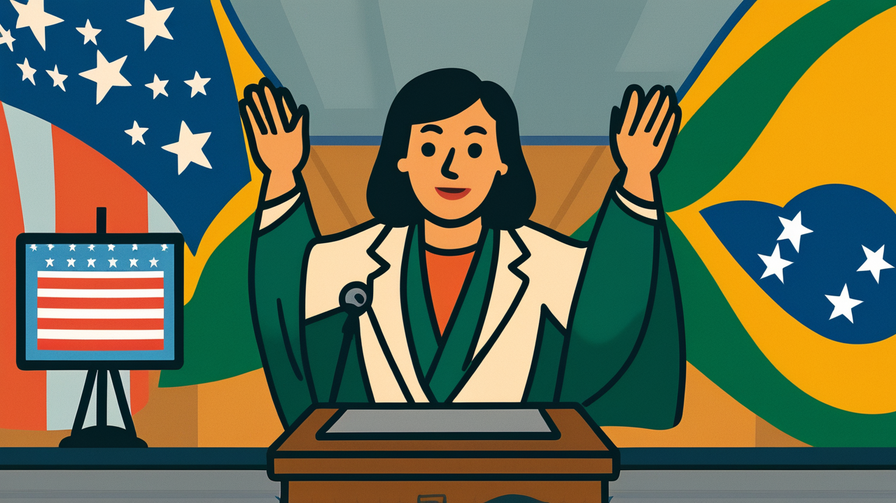[Disclaimer] This article is reconstructed based on information from external sources. Please verify the original source before referring to this content.
News Summary
The following content was published online. A translated summary is presented below. See the source for details.
The United States has announced immediate visa restrictions against Brazilian Supreme Federal Court Justice Alexandre de Moraes, other court allies, and their immediate family members. Secretary of State Marco Rubio announced the decision on July 18, 2025, stating that Justice Moraes led what the Trump administration calls a “political witch hunt” against former Brazilian President Jair Bolsonaro. The US government claims that Moraes’s actions created a system of persecution and censorship that extends beyond Brazil’s borders to affect Americans. The visa restrictions are implemented under immigration law provisions that allow the Secretary of State to deny entry to individuals whose presence could have serious negative consequences for US foreign policy. This marks a significant diplomatic action between the two countries.
Source: U.S. Department of State
Our Commentary
Background and Context

To understand this diplomatic conflict, we need to know about recent Brazilian politics. Jair Bolsonaro served as Brazil’s president from 2019 to 2022 and was known for his conservative views and confrontational style, often compared to Donald Trump. After losing the 2022 election to current President Luiz Inácio Lula da Silva, Bolsonaro faced various legal challenges.
Justice Alexandre de Moraes has been a controversial figure in Brazil, leading investigations into what he considers threats to democracy, including the spread of misinformation on social media. He has ordered the blocking of social media accounts, including those of Bolsonaro supporters, and has been involved in cases against the former president. These actions have divided Brazilian society between those who see him as defending democracy and others who view him as overstepping judicial boundaries.
Expert Analysis
This visa restriction represents an unusual direct intervention by one country into another’s judicial affairs. Typically, countries avoid commenting on each other’s internal legal processes unless they involve their own citizens. The US action suggests the Trump administration believes Brazilian judicial actions have affected American interests or citizens, though specific examples weren’t provided in the announcement.
The legal mechanism used – Section 212(a)(3)(C) of the Immigration and Nationality Act – gives the Secretary of State broad power to deny visas when someone’s entry could harm US foreign policy interests. This tool is usually reserved for serious situations involving terrorism, corruption, or human rights violations. Its use here signals how seriously the US views the situation.
Additional Data and Fact Reinforcement
Brazil and the United States have traditionally maintained strong diplomatic relations. Brazil is the largest country in South America with over 215 million people and the world’s 12th largest economy. The two countries have approximately $100 billion in annual trade, making this diplomatic tension potentially significant for both economies.
Visa restrictions like these affect not just the named individuals but also their ability to conduct international business, attend conferences, or engage in diplomatic activities. Family members are included to increase pressure, as many Brazilian elites have children studying in US universities or own property in America.
Related News
This action follows a pattern of the Trump administration taking strong stances on free speech issues internationally. Similar visa restrictions have been threatened or implemented against officials from other countries accused of censorship or persecution of political opponents.
The timing is significant as it comes just months after President Trump returned to office in January 2025. Brazil’s President Lula, who has generally good relations with the Biden administration, now faces a more challenging diplomatic environment with the US under Trump’s leadership.
Summary

This visa restriction marks a significant escalation in US-Brazil tensions and demonstrates how domestic political conflicts can spill over into international relations. While the US frames this as defending free speech and opposing political persecution, Brazil will likely view it as interference in its sovereign judicial system. The coming months will show whether this leads to further diplomatic tensions or if both countries will seek to minimize the conflict’s impact on their broader relationship.
Public Reaction
Reactions have been sharply divided along political lines. Bolsonaro supporters celebrated the US action on social media, viewing it as international validation of their claims of judicial persecution. Supporters of the current Brazilian government and Justice Moraes condemned it as inappropriate meddling in Brazil’s internal affairs. Legal experts in both countries have debated whether this sets a concerning precedent for judicial independence.
Frequently Asked Questions
Q: What does a visa restriction mean?
A: It means the person cannot enter the United States for any reason – tourism, business, or official duties. They cannot get a visa to visit, and if they already have one, it’s canceled. This also typically prevents them from transiting through US airports.
Q: Why include family members?
A: Including family members increases pressure on the targeted officials. Many Brazilian elites have children attending US universities or own vacation homes in America. This makes the restrictions more personally impactful.
Q: Could this affect US-Brazil relations?
A: Yes, diplomatic actions like this can strain relationships between countries. It might affect cooperation on issues like trade, environmental protection in the Amazon, or regional security. However, both countries have strong economic ties that provide incentives to manage the conflict.


